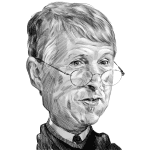That. Can you give Bernardo Kastrup’s model of what occurs with the dissolution of the body? Does the conditioning, the tendencies that still exist, fall back into awareness and then eventually coalesce in the form again? And yet, all of it’s impersonal. Okay,
Remember Camille, William Blake from this morning. The body is that portion of the soul, that portion of the mind that is discernible to the five senses. We all know from our internal experience that there is very much more to us than our body.
And yet, when somebody looks at us from the outside, all they see is a body. When you look at me, you just see my body. That’s all I am to you experientially in this moment. I’m not talking
About your thoughts and things, but your actual experience of me in this moment is just this body. Well, and it’s the same for all of us, but we all well know that there is very much more to our internal experience than just the perception of the body. So, as William Blake said,
The body is just that small part of the mind that is registered by the senses. So, when it dies, when the body dies… At least a part of the mind, if the body is the external as we said this morning, if the body is
The external appearance of the internal experience of mind, and each of our minds is a localization of consciousness, then what does the appearance of the death of the body correspond to internally? It corresponds to the delocalizing of consciousness. Consciousness has localized itself in the form of
Each of our minds, and that localization appears from the outside as a body. Now, when the body appears from the outside to die and disintegrate, what is happening on the inside? Consciousness, which localized itself in the form of a finite mind, begins to delocalize itself
And return to its natural state of infinite awareness. But remember, the body is only an appearance of that part of the mind that is discernible to another person’s sense perceptions. So, the disappearance, the complete disappearance of the body doesn’t necessarily correspond with the complete disappearance of the mind.
It just corresponds to the disappearance of that part of the mind that another person’s perceiving faculties register. What I’m suggesting is that the death and disappearance of the body is not necessarily the death or disappearance of the mind which appeared as that body,
Right? It could be that it corresponds to the dissolution of an aspect of that mind, but part of that mind, as it decontracts and goes back to consciousness, could remain in the field of infinite consciousness but not be discernible
To the five senses. This would correspond, for instance, in the Christian tradition to an angel. We can’t see angels, so could it be that an angel is obviously still an angel, is not infinite consciousness, it is an entity of some kind, but it’s not discernible
To our five senses. And that’s why we tend not to believe in angels because in our materialistic society, we only believe in things that are discernible to our five senses. But our five senses only pick up a very narrow bandwidth of reality. We tend to think that anything
Outside that bandwidth is non-existent. No, it’s not non-existent, it’s just not discernible by the five senses. So, an angel or an angelic presence could be an aspect of mind that is not registered, that doesn’t appear on the radar of the five senses, it’s not sensitive
Enough to pick up. So, there could be entities made of mind that don’t appear in time and space because time and space are just a limited framework that our capacities of thinking and perceiving impose on reality. Just because they don’t fit into time and
Space doesn’t mean they don’t exist in reality. So, when somebody dies, a part of their mind, that part of their mind that is discernible as the body, could disintegrate or unravel, but a deeper aspect of their mind could remain. It may continue to delocalize and go all the way
Back to infinite consciousness, or it could remain in some disembodied form and coalesce downstream and form the basis of a new entity, which later on will be perceived by another person as a new body. Okay, and then the mind, in order to try to make sense of this experience, would interpret
It in a way that is consistent with its own limitations and think, “Oh, this was a past life.” And the conditioning is impersonal. I think you said that one time. All conditioning is impersonal in this sense that in the ultimate nonsense, there are no individual discrete personal entities.
There is just the One, the infinite localizing itself as apparently separate individuals without ever actually ceasing to be itself. There are no personal people. In your dreams, you may dream of having a dinner party with 12 people, but there are not really 12 entities. They
Are all different aspects of the One Mind, the dreamer’s mind. They’re unreal entities there. So, you could never hold a character in your dream accountable for the actions that they undertook because there’s no real person there.
































 Reaction & Commentary
Reaction & Commentary












